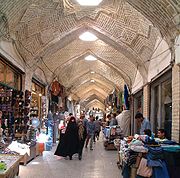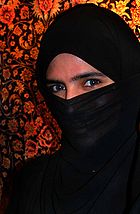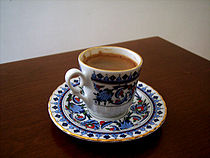
Etiquette in the Middle East
Encyclopedia

Islam
Islam . The most common are and . : Arabic pronunciation varies regionally. The first vowel ranges from ~~. The second vowel ranges from ~~~...
as it is written in the Qur'an
Qur'an
The Quran , also transliterated Qur'an, Koran, Alcoran, Qur’ān, Coran, Kuran, and al-Qur’ān, is the central religious text of Islam, which Muslims consider the verbatim word of God . It is regarded widely as the finest piece of literature in the Arabic language...
and how it has been traditionally understood and practiced throughout the centuries. Prescribed Islamic etiquette
Etiquette
Etiquette is a code of behavior that delineates expectations for social behavior according to contemporary conventional norms within a society, social class, or group...
is referred to as Adab
Adab (behavior)
Adab, in the context of behavior, refers to prescribed Islamic etiquette: "refinement, good manners, morals, decorum, decency, humaneness". While interpretation of the scope and particulars of Adab may vary among different cultures, common among these interpretations is regard for personal standing...
, and described as "refinement, good manners, morals, ethics, decorum, decency, humaneness and righteousness".
As such, many points discussed in this article are applicable in other regions of the Islamic world. This holds especially true in Muslim majority countries outside Middle East.

Eastern Orthodox Church
The Orthodox Church, officially called the Orthodox Catholic Church and commonly referred to as the Eastern Orthodox Church, is the second largest Christian denomination in the world, with an estimated 300 million adherents mainly in the countries of Belarus, Bulgaria, Cyprus, Georgia, Greece,...
, Copt
Copt
The Copts are the native Egyptian Christians , a major ethnoreligious group in Egypt....
s and other adherents of Oriental Orthodoxy
Oriental Orthodoxy
Oriental Orthodoxy is the faith of those Eastern Christian Churches that recognize only three ecumenical councils — the First Council of Nicaea, the First Council of Constantinople and the First Council of Ephesus. They rejected the dogmatic definitions of the Council of Chalcedon...
, Maronites
Maronites
Maronites , is an ethnoreligious group in the Middle East that have been historically tied with Lebanon. They derive their name from the Syriac saint Mar Maron whose followers moved to Mount Lebanon from northern Syria establishing the Maronite Church....
, Melkites
Melkite Greek Catholic Church
The Melkite Greek Catholic Church is an Eastern Catholic Church in full communion with the Holy See as part of the worldwide Catholic Church. The Melkites, Byzantine Rite Catholics of mixed Eastern Mediterranean and Greek origin, trace their history to the early Christians of Antioch, Syria, of...
and other Catholics of the Eastern Rites as well as the Roman Rite, Zoroastrians, Bahá'ís
Bahá'í Faith
The Bahá'í Faith is a monotheistic religion founded by Bahá'u'lláh in 19th-century Persia, emphasizing the spiritual unity of all humankind. There are an estimated five to six million Bahá'ís around the world in more than 200 countries and territories....
, and various Jewish denominations.
In many cases, however, Muslims and non-Muslims in the Middle East will share characteristics, whether it is the prohibition against pork
Pork
Pork is the culinary name for meat from the domestic pig , which is eaten in many countries. It is one of the most commonly consumed meats worldwide, with evidence of pig husbandry dating back to 5000 BC....
ordained by both Islamic
Halal
Halal is a term designating any object or an action which is permissible to use or engage in, according to Islamic law. The term is used to designate food seen as permissible according to Islamic law...
and Jewish
Kashrut
Kashrut is the set of Jewish dietary laws. Food in accord with halakha is termed kosher in English, from the Ashkenazi pronunciation of the Hebrew term kashér , meaning "fit" Kashrut (also kashruth or kashrus) is the set of Jewish dietary laws. Food in accord with halakha (Jewish law) is termed...
dietary restrictions, a preference for the beverage widely known elsewhere as "Turkish coffee
Turkish coffee
Turkish coffee is a method of preparing coffee where finely powdered roast coffee beans are boiled in a pot , with sugar according to taste, before being served into a cup where the dregs settle...
", or knowledge of how to conduct business in a crowded souk
Souk
A souq is a commercial quarter in an Arab, Berber, and increasingly European city. The term is often used to designate the market in any Arabized or Muslim city, but in modern times it appears in Western cities too...
without being cheated. As coexistence, rather than conflict, has been the norm between people in the Middle East throughout much of history, it is a place where people with different beliefs often share the same traditions.
Points of etiquette
Although the Middle East is a large expanse of geography with a variety of customs, noting the following points of etiquette can be useful when dealing with people around the world who have been raised according to the traditions of the Middle East or, in some cases, Muslim societies elsewhere.- Conducting business effectively in a souk or bazaarBazaarA bazaar , Cypriot Greek: pantopoula) is a permanent merchandising area, marketplace, or street of shops where goods and services are exchanged or sold. The term is sometimes also used to refer to the "network of merchants, bankers and craftsmen" who work that area...
requires an understanding of how to haggleHaggleHaggle may refer to*Haggle , a party game*Haggle an autonomic networking architecture*Bargaining, English word meaning to haggle or to bargain...
like the locals. This is an art requiring participants to be appropriately aggressive, keen to how much should be offered at a given point in a transaction, etc. - The modestyModestyStandards of modesty are aspects of the culture of a country or people, at a given point in time, and is a measure against which an individual in society may be judged....
of one's personal attire is of great concern to many in the Middle East, although the parameters of this modesty vary. In Saudi ArabiaSaudi ArabiaThe Kingdom of Saudi Arabia , commonly known in British English as Saudi Arabia and in Arabic as as-Sa‘ūdiyyah , is the largest state in Western Asia by land area, constituting the bulk of the Arabian Peninsula, and the second-largest in the Arab World...
, for example, many families expect all female members to wear a hijabHijabThe word "hijab" or "'" refers to both the head covering traditionally worn by Muslim women and modest Muslim styles of dress in general....
while even men and women visiting from other cultures should wear very non-revealing clothes to avoid harsh confrontation. In another example, males and females in shorts, skimpy t-shirts or other "immodest" clothes might find themselves evicted from a variety of places, especially holy sites (be they tended by Muslims or Jews). Get specific guidelines from locals when possible.

- Regarding head attire specifically, the etiquette at many Muslim holy sites requires that a headscarfHeadscarfHeadscarves or head scarves are scarves covering most or all of the top of a woman's hair and her head. Headscarves may be worn for a variety of purposes, such as for warmth, for sanitation, for fashion or social distinction; with religious significance, to hide baldness, out of modesty, or other...
or some other modest head covering be worn. For women this might be a hijabHijabThe word "hijab" or "'" refers to both the head covering traditionally worn by Muslim women and modest Muslim styles of dress in general....
and for men it might be a taqiyah (cap)Taqiyah (cap)The taqiyah is a short, rounded cap worn by some observant Muslim men. When worn by itself, the taqiyah can be any color. When worn under the keffiyah scarf, it is always white. Some Muslims wrap the turban around the cap. The turban is called an imama in Arabic...
, turbanTurbanIn English, Turban refers to several types of headwear popularly worn in the Middle East, North Africa, Punjab, Jamaica and Southwest Asia. A commonly used synonym is Pagri, the Indian word for turban.-Styles:...
, or keffiyehKeffiyehThe keffiyeh/kufiya , also known as a ghutrah , ' , mashadah , shemagh or in Persian chafiye , Kurdish cemedanî and Turkish puşi, is a traditional Arab headdress fashioned from a square, usually cotton, scarf. It is typically worn by Arab men, as well as some Kurds...
. A kippahKippahA kippah or kipa , also known as a yarmulke , kapele , is a hemispherical or platter-shaped head cover, usually made of cloth, often worn by Orthodox Jewish men to fulfill the customary requirement that their head be covered at all times, and sometimes worn by both men and, less frequently, women...
or other head covering is expected for men in synagogueSynagogueA synagogue is a Jewish house of prayer. This use of the Greek term synagogue originates in the Septuagint where it sometimes translates the Hebrew word for assembly, kahal...
s and other places where Jews pray. Orthodox Christian sites might require the removal of hats by men but will expect women to cover their hair with a kerchiefKerchiefA kerchief is a triangular or square piece of cloth tied around the head or around the neck for protective or decorative purposes...
or veilVeilA veil is an article of clothing, worn almost exclusively by women, that is intended to cover some part of the head or face.One view is that as a religious item, it is intended to show honor to an object or space...
. - Among Muslims, the left hand is reserved for bodily hygiene and considered unclean. Thus, the right hand should be used for eating. Shaking hands or handing over an item with one's left hand is considered an insult.
- Public displays of affection between people of the opposite gender, including between married people, are frowned upon everywhere more conservative values hold sway. Public displays of affection include activities as minor as hand-holding.
- In many cases, people of the same gender holding hands while walking is considered an ordinary display of friendship without romantic connotations.
- In a related point, many people in the Middle East claim a more modest amount of personal spacePersonal spacePersonal space is the region surrounding a person which they regard as psychologically theirs. Most people value their personal space and feel discomfort, anger, or anxiety when their personal space is encroached. Permitting a person to enter personal space and entering somebody else's personal...
than that which is usual elsewhere. Accordingly, it can seem rude for an individual to step away when another individual is stepping closer. - Special respect is paid to older people in many circumstances. This can include standing when older people enter a room, always greeting older people before others present (even if they are better known to you), standing when speaking to one’s elders and serving older people first at a meal table.

- Many people throughout the Middle East, especially Persians and Arabs, take great pride in shows of hospitalityHospitalityHospitality is the relationship between guest and host, or the act or practice of being hospitable. Specifically, this includes the reception and entertainment of guests, visitors, or strangers, resorts, membership clubs, conventions, attractions, special events, and other services for travelers...
, never failing to at least serve chai, coffeeCoffeeCoffee is a brewed beverage with a dark,init brooo acidic flavor prepared from the roasted seeds of the coffee plant, colloquially called coffee beans. The beans are found in coffee cherries, which grow on trees cultivated in over 70 countries, primarily in equatorial Latin America, Southeast Asia,...
and a snack such as figsFIGSFIGS is an acronym for French, Italian, German, Spanish. These are usually the first four languages chosen to localize products into when a company enters the European market....
but preferring to present guests with a lavish choice of expensive delicacies in abundance. To refuse such hospitality can cause offense. - In some areas in the Middle East, it is common for people to take their food from a common plate in the center of the table. Rather than employing forkForkAs a piece of cutlery or kitchenware, a fork is a tool consisting of a handle with several narrow tines on one end. The fork, as an eating utensil, has been a feature primarily of the West, whereas in East Asia chopsticks have been more prevalent...
s or spoonSpoonA spoon is a utensil consisting of a small shallow bowl, oval or round, at the end of a handle. A type of cutlery , especially as part of a place setting, it is used primarily for serving. Spoons are also used in food preparation to measure, mix, stir and toss ingredients...
s, people may scoop up hummusHummusHummus is high in iron and vitamin C and also has significant amounts of folate and vitamin B6. The chickpeas make it a good source of protein and dietary fiber; the tahini consists mostly of sesame seeds, which are an excellent source of the amino acid methionine, complementing the proteins in the...
and other foodstuff with pita breadPitaPita or pitta is a round pocket bread widely consumed in many Middle Eastern, Mediterranean, and Balkan cuisines. It is prevalent in Greece, the Balkans the Levant, the Arabian Peninsula and Turkey. The "pocket" in pita bread is created by steam, which puffs up the dough...
. - In many Middle Eastern countries, grouping the thumb and fingers together, and shaking it up and down, fingers pointing upwards, indicates "wait".
- In Iran, the "thumbs up" gesture is considered an offensive insult
- Displaying the sole of one's foot or touching somebody with one's shoe is often considered rude. This includes sitting with one's feet or foot elevated. In some circumstances, shoes should be removed before entering a living room.
- Many in the Middle East do not separate professional and personal life. Doing business revolves much more around personal relationships, family ties, trust and honor. There is a tendency to prioritize personal matters above all else. It is therefore crucial that business relationships are built on mutual friendship and trust.
- Responding to an anger or seriousness with light laughter or a smile is common. This must not be seen as an indication that the other person is not taking you or the situation seriously.
- A common custom in many Middle Eastern countries is 'tarof' (or taarofTaarofT'aarof/ Tarof is a Persian form of civility emphasizing both self-deference and social rank. The term encompasses a range of social behaviours, from a man displaying etiquette by opening the door for a woman, to a group of colleagues standing on ceremony in front of a door that can permit the...
) which can be translated as 'offering'. It is common for a person not to accept an offering (food, beverages etc.) the first or possibly second time, instead taking up the offer the third time. This traditionally implies dignity, self-respect and respect for the host. In addition, if there is only one item of food left, the host must offer, or taarof it, to everyone, regardless of whether or not he or she wants it. Finally, it is considered rude if a person gets food for himself or herself without bringing some for the guests. - Positioning yourself so your back is not facing another person is customary in IranIranIran , officially the Islamic Republic of Iran , is a country in Southern and Western Asia. The name "Iran" has been in use natively since the Sassanian era and came into use internationally in 1935, before which the country was known to the Western world as Persia...
and IraqIraqIraq ; officially the Republic of Iraq is a country in Western Asia spanning most of the northwestern end of the Zagros mountain range, the eastern part of the Syrian Desert and the northern part of the Arabian Desert....
. If a person's back is facing another person, he or she must excuse himself or herself.

